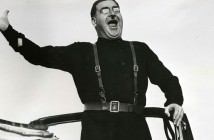Cast: Viv Albertine, Liam Gillick, Tom Hiddleston
Director: Joanna Hogg
Country: UK
Genre: Drama
Editor’s Notes: The following review is part of our coverage of the Locarno International Film Festival. For more information on the festival visit pardolive.ch and follow the Locarno International Film Festival on Twitter at @FilmFestLocarno.
There’s much to be mused over in Exhibition, the title as much as the film itself. The literal among us might interpret it to refer to the art show secured by the movie’s main character—identified in the credits only as D—as the story comes to a close. Those more psychoanalytical would take it to name the strange displays of sexuality she makes through her house’s large windows at night. Either reading is valid, but maybe it’s to that home setting itself—a modernist architectural curio, the sale of which offers the film’s closest semblance of narrative—that writer/director Joanna Hogg points with her title: are D and her husband H, fancifully maintaining the façade of happy marriage in this transparent living space, not some exhibition in themselves?
Hogg’s construction is meticulous: almost every scene is shot from a sole choice perspective, the camera rarely moving as it freezes us to one spot like a passer-by caught up incidentally in this drama.
It’s a concept the film foregrounds, most particularly in the Hanekesque invocation of spectatorship. Hogg’s construction is meticulous: almost every scene is shot from a sole choice perspective, the camera rarely moving as it freezes us to one spot like a passer-by caught up incidentally in this drama. The shadow of Caché very prominently lingers, perhaps even directly addressed in an early angle eerily similar to that film’s now-infamous Parisian opening shot. What we see and how we see it are crucial here; Hogg’s minimalist aesthetic is masterfully controlling, meticulously constructing the physical confines of the story as her script locates its characters within the psychological spaces it serves to externalise. Her direction is precise and particular, guiding the eye but taking care not to force it, manipulating our viewership but never at the expense of our own interpretations.
If Haneke is the director with whom Hogg’s formal tendencies feel most in synch, it’s Athina Rachel Tsangari with whom her work shares the strongest connection in content terms. The heroines of Attenberg and Exhibition have a great deal in common: despite the differing ends of the sexual experience scale they may occupy, each manifests in a similar way her raw physicality. It’s doubly important in D’s case, given her work as a performance artist; Hogg’s occasional cutaway shots to her wrapped around the contours of her home act—as well as lightly absurd comic relief—as externalisations of her mental discomfort within her many roles. It’s an efficiently realised psychological performance by Viv Albertine in her film debut, the coy coquettishness with which she goes about her scenes projecting a woman more than mildly out of step with her own existence.
Beyond the exploration of gender roles—so pronounced, particularly in the bedroom, as to make it seem as though D and H could stand for “Dame” und “Herr”—Hogg retains the focus on class that characterised her earlier works. There’s a barbed irony to the faux-bohemianism of D and H, the idyllic life as symbolised by this striking structure gradually exposed for the hollow show it is. A series of scenes see them sharing meals with a more middle class couple, whose conversation revolves exclusively around their troubles in managing their teenage child. At one point D casts herself to the floor, feigning a faint, rather than listen to more of their everyday troubles. It’s a deliberate complication of the empathy invoked, reminding us that for all this woman’s existential strife, she remains herself blind to the more primal concerns of those ordinary folk beyond her lavish walls.
If Haneke is the director with whom Hogg’s formal tendencies feel most in synch, it’s Athina Rachel Tsangari with whom her work shares the strongest connection in content terms. The heroines of Attenberg and Exhibition have a great deal in common.
As much as Hogg layers her sequences in psychological significance, Exhibition’s minimalism is as a fire blanket to the flames of her concerns, starving the movie of the kind of forward-moving fuel it needs to lend these ideas weight rather than simply presence. There’s a prevailing sense of committal without conviction, as though Hogg is intent on furthering her aesthetic sensibilities without developing alongside them more mature narrative capabilities. The resultant film is stunning to look at, no doubt, yet sadly devoid of any great deal to dwell on beyond: it’s more a film to be looked at than laboured over, less a true exposition of its titular concern than an alluring exhibition in itself.
[notification type=”star”]69/100 ~ OKAY. Exhibition is more a film to be looked at than laboured over, less a true exposition of its titular concern than an alluring exhibition in itself. [/notification]




